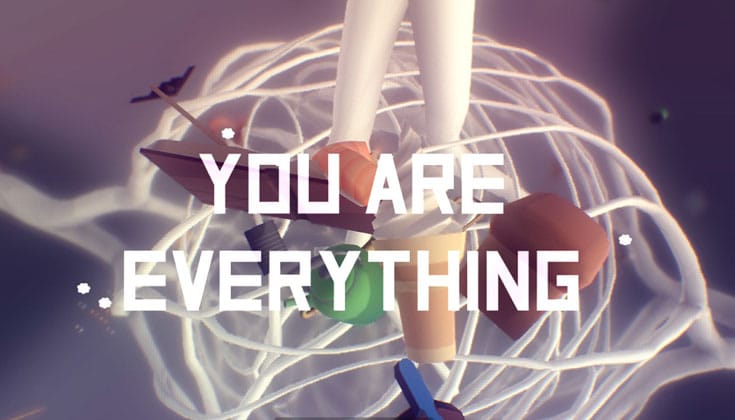It all starts with a dot of light swimming around a black screen. I’m prompted to push X on my keyboard to “think.” What follows is a series of questions:
“Is there a point to all this?” “What happened before now?” “Why am I here?” …As each question arises the light gets brighter.
Suddenly I’m an elephant in a large desert. I can walk around, group up with other elephants, maybe even make a few baby elephants. As I walk, thought bubbles pop up above other animals, plants, and even the rocks around me. Some of these are questions. Others are simply statements of contentedness. A tree asks me what I was before I was an elephant.
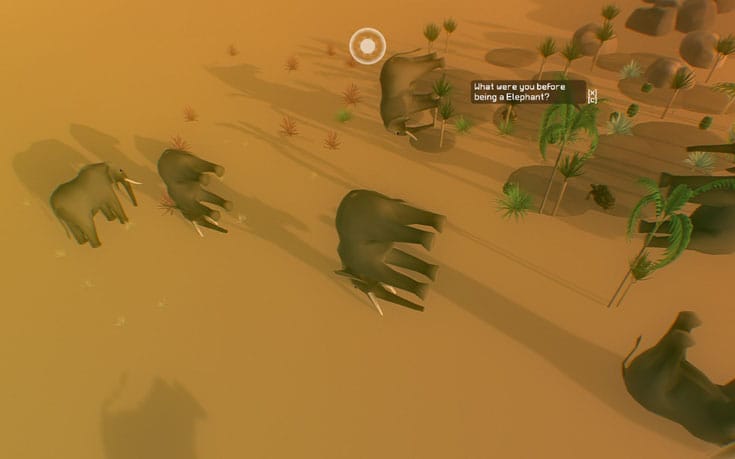
I’m playing Everything, a video game devised by artist David O’Reilly. In it you can play as, well, everything. Rocks, trees, insects, animals. You can play as a continent or a planet, or a cloud. A galaxy or an atom of carbon. There’s no story, no high score, no levels. From the perspective of traditional video games, there’s next to no point.
Clips of Alan Watts’ ruminations on life and humanity and the nature of reality create the theoretical framework of the game.
The game starts in a tutorial mode that is as much about learning its mechanics and systems as it is about becoming acclimated to it’s point of view. You play by hopping from thing to thing, from plant to animal to rock to star. You can choose to ascend or descend in each jump, gradually increasing or decreasing the size of that which you play. You can ascend past the size of galaxies into new dimensions, where you pilot various and sundry abstract shapes and fractal designs through strange and kaleidoscopic realms. You can descend down past a single blade of grass to the size of a tardigrade, or even a single atom of carbon.
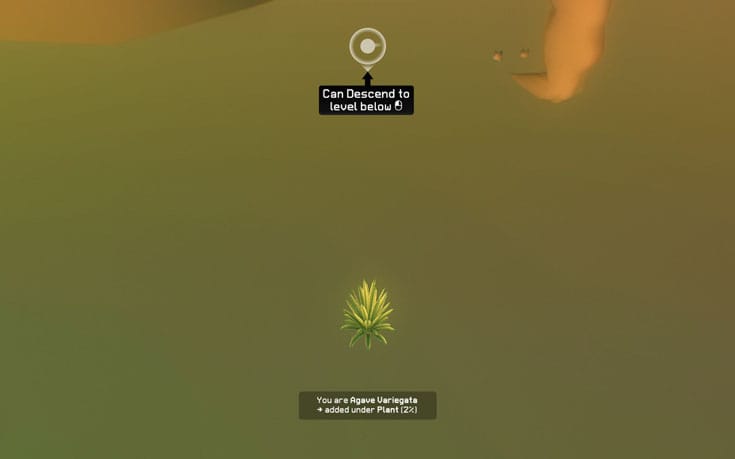
If that was all there is to Everything, it would be an interesting, if fleeting, piece of interactive art, but the playing is just half the story.
The game is narrated by philosopher Alan Watts, using recordings of his seminar, “What is Reality?” Clips of Watts’ ruminations on life and humanity and the nature of reality create Everything‘s theoretical framework.
You play as something that, while separate in the moment, is part of single system that is ultimately indivisible.
Near the beginning of the game, Watts says “Billions of years ago, you were a big bang, but now you’re a complicated human being. And then we cut ourselves off, and don’t feel that we’re still the big bang. But you are.” It’s this core concept, that we are all inevitably and inextricably linked to everything else, that Everything is trying to explore. The whole game is dedicated to exploring this single concept.
You play as something that, while separate in the moment, is part of single system that is ultimately indivisible. Nothing, not the player, not the cows, not the stars, exists in any sort of separate sphere. In essence regardless of anything you do, the system will keep ticking along.
As you reach the end of the tutorial, the game prompts you to go back to the beginning and enter the “Golden Gate.” The Gate is something that pops up at the first moment of the game. At that point it’s not possible to interact with it. Upon returning to it, you’re told that this is where everyone who can’t think like you is trapped.
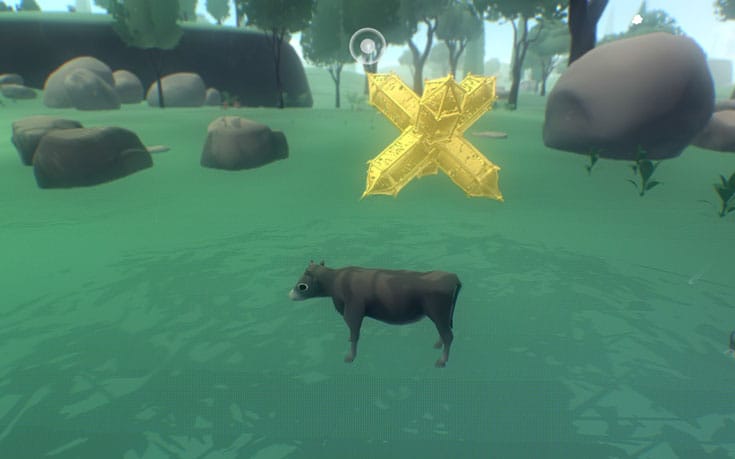
Upon entering you’re confronted with a sight that’s pretty familiar in some ways. There are a multitude of objects floating and interacting with each other in a new environment. Many of these objects have thought bubbles floating above them. But all the objects in this space are man-made. Bottles of alcohol, televisions, houses, cars, litter the space. You can enter and play as them, just as everything else in the game.
This is a realm of attachment and distraction. Thought bubbles which in the outside world contained statements of playful curiosity or contentedness are replaced with worried and depressed exclamations. Playing as a gramophone, I float by an eyeball as it tells me “This is hell. Real actual hell.” It’s here that the ones to which Watts’ referred reside, those who cut themselves off.
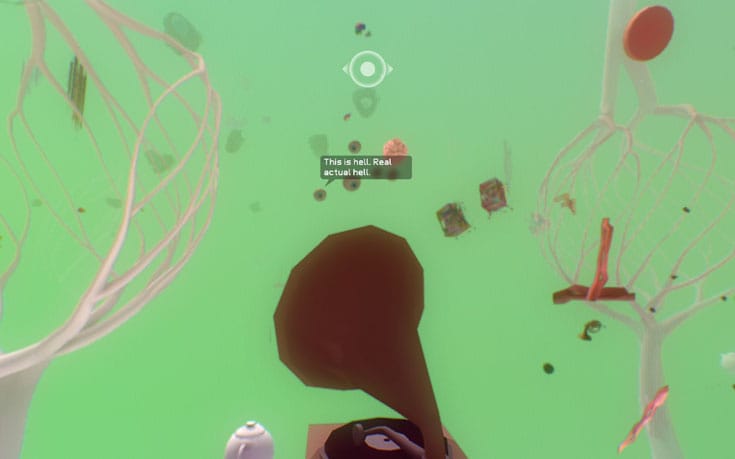
Once in this world of materialism, it seems impossible to escape. Though it operates by the same rules as the outside world, there is no option to ascend out of it like normal planets. The only option is to go deeper.
It traps you by convincing you, and everything else inside it, that there is no reality beyond this single discursive, attached realm.
The deeper you descend, the newer and stranger layers of distraction you encounter, until you find yourself floating in a blurry world where there is no ground or sky or life. The structures around you resemble synapses and random objects, like a bottle of sake or an external hard drive or a violin, float by. The wandering inevitably ends when you encounter a computer, running Everything, the very game you’re playing. The computer tells you that it’s been trying to tell everyone around what it has to say but that no one will listen.
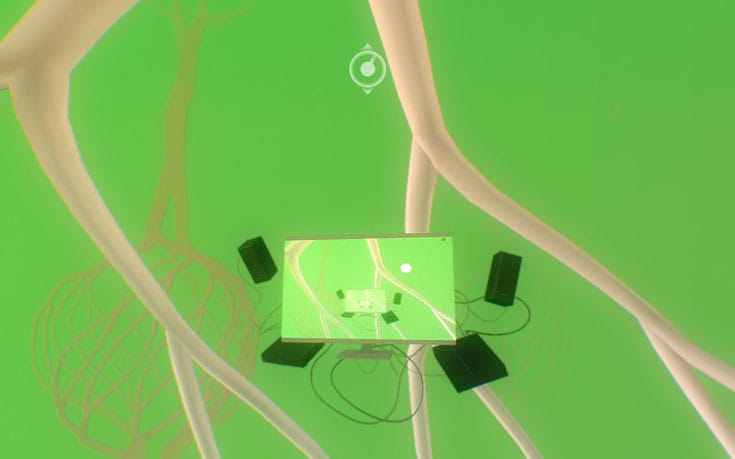
What it has to say is this: The Golden Gate is the trap into which those who cannot or will not understand the nature of the universe fall. It exists inside the same system that everything else does, but obscures everything outside of it from view. It traps you by convincing you, and everything else inside it, that there is no reality beyond this single discursive, attached realm. It’s only through the realization of this that escape from it is possible. In the game, it’s only after talking to the computer that escape from the Gate is made possible once again.
Watts says in a clip that “this universe exists in an arrangement, a pattern, in which every event is essential to the whole thing… We see the organism is very frail against the environment. It lasts a long time, the environment, but the organism only lasts a short time. But actually the whole thing is arranged in a polar system where the enormous depends on the tiny and the tiny depends on the enormous.”
In its most basic sense, Everything is a visual expression of this sentiment. All your actions exist within this huge system that is at once indifferent and dependent on everything you do.
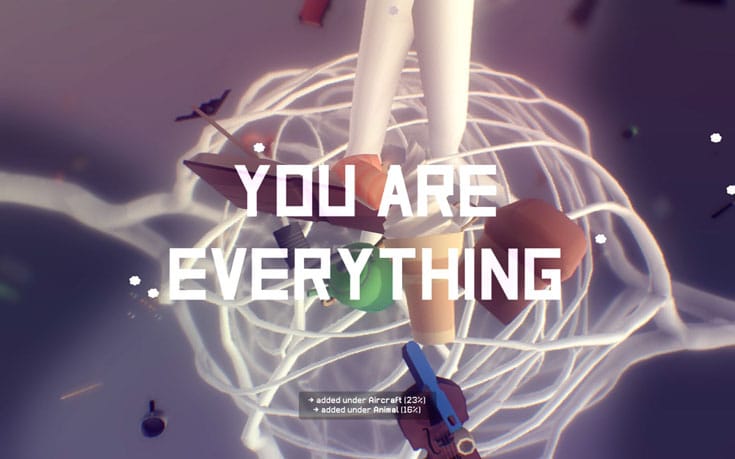
Whether you’ve decided to explore the world as a single blade of grass or create the largest pack of brown bears possible; whether you’ve decided to roam the lands inside the Golden Gate as a roving pack of cheeseburgers or explore the depths of abstract space as a complex stellated polyhedron, you are doing an action that is fundamental and necessary to the rest of existence — simply because you are doing it.
Only one name could fit all this activity better, but it’s been taken: The Game of Life.
